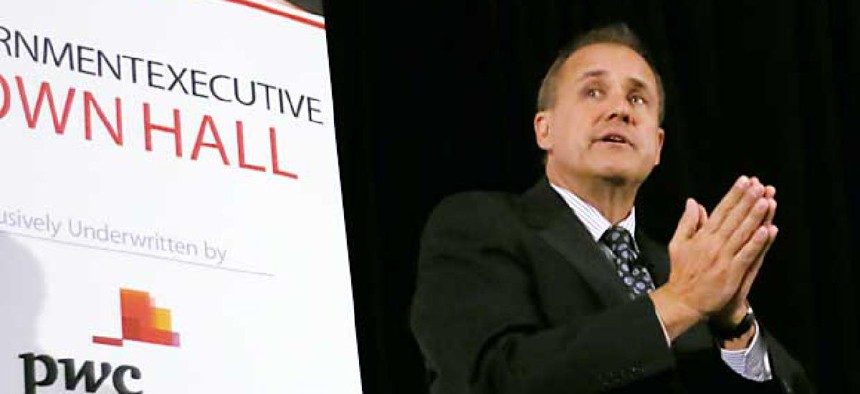
Jim Nussle, the former Office of Management and Budget director under George W. Bush, appeared at the event Thursday. Sarah Scully/GovExec.com
Fiscal 'cliff' might look more like a gradual, downward slope
Ex-budget chief says terminology may be too dramatic.
A former budget chief in both the legislative and executive branches said Thursday the United States might not be headed for a fiscal “cliff” at all, because the effects of sequestration and tax cut expirations likely would be felt slowly over time.
Jim Nussle, Office of Management and Budget director under George W. Bush and a former Republican congressman from Iowa, said at a town-hall event hosted by Government Executive Media Group that the fiscal events at the turn of the New Year may not end up being as dramatic as they have been forecasted to be.
“People are suggesting it’s almost like Wile E. Coyote, you go over the cliff and down like a poof of smoke,” he said. “That’s not what this might look like . . . there is some leeway if you will, or some flexibility.”
Nussle added this increases the likelihood of Congress simply “kicking the can down the road” by delaying the expiration of the Bush-era tax cuts and the automatic cuts from sequestration.
He warned against this tactic, however, and said the threat of sequestration still might be enough to force a deal.
“I believe that at 62 percent of debt to [gross domestic product] our country is on an unsustainable path and we should use this opportunity to fix the debt and fix the situation we’re in,” he said. “Congress and the president need action-forcing events and this is a pretty good one.”
In approaching a “grand bargain,” as a potential bipartisan deal to avoid the “cliff” has been called, Nussle said both sides should come into negotiations with four things in mind.
First, he said, nothing should be taken off the table. He also pointed to entitlement reform as a place for savings, and said revenues -- though not necessarily taxes -- must be increased. Finally, he stressed the importance of lowering the debt-to-GDP ratio.
As agencies prepare for possible budget cuts, Nussle’s advice was simply to carry on, as federal employees have not had much “predictability” during the last five or six years.
“You haven’t had the ability to plan and make the programmatic decisions that are necessary if you’re going to be effective as public servants,” Nussle said.
He added, however, that agencies should begin to think about the looming budget cuts, as “anyone assuming sequestration will not happen is making a bad assumption.”
Nussle, who served 16 years in Congress, including six as House Budget Committee chairman, said he used to be among the politicians who derided federal bureaucrats. After becoming one, however, he now empathizes with them.
“Just like politicians, there are a few bad ones,” he said. “But most are very good at what they do, they care enormously about the job they try to accomplish every day, they’re very professional about it and they’re very worried about the future of their own program, let alone the future of their job and their co-worker’s job.”
NEXT STORY: Smart Policies for Smartphones in the Workplace







